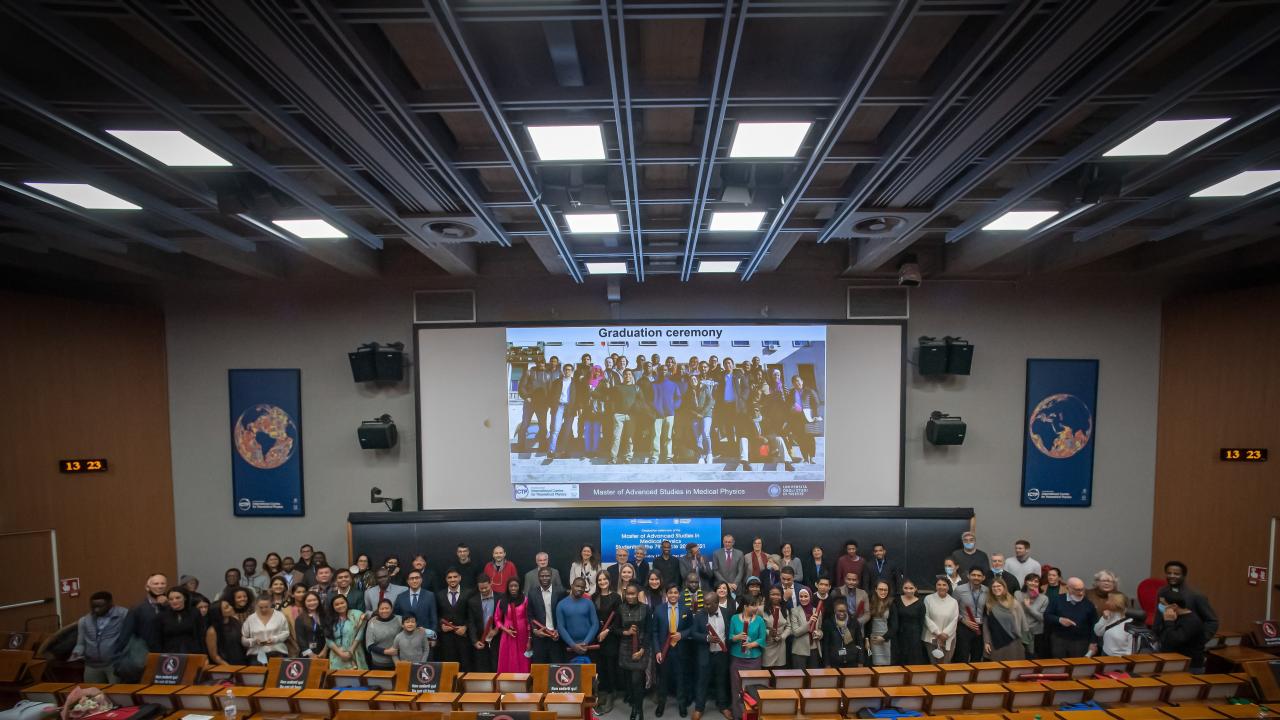
The 2021 Class of the Master's in Advanced Studies in Medical Physics Programme (MMP) arrived in Trieste to start their studies in January 2020, with no apprehension of how the world was about to change. Today, ICTP celebrated their hard work through tough times, with the graduation of twenty four medical physicists hailing from twenty one countries at a hybrid graduation ceremony broadcast to supporters around the world.
Medical physicists typically work in hospitals, applying the principles of physics to treatment protocols for a wide variety of human diseases. From using radiation to treat cancer, radiology or medical imaging, and nuclear medicine, medical physicists work with different types of doctors to prepare treatment plans. Uniquely among the physics training programmes offered by ICTP, the MMP includes a year of clinical studies in a network of training hospitals around Italy, supported by the Italian Association of Medical Physics (AIFM). This follows an intense year of theoretical training in Trieste, where students learn the basis of cutting edge technologies available to medical physicists.
The MMP Programme is co-organised by the University of Trieste and co-sponsored by the International Atomic Energy Agency (IAEA). The graduation ceremony featured remarks from representatives of ICTP, the University of Trieste, and the IAEA. In addition, Rashaun Watson, First Secretary of the Permanent Mission of Jamaica to the United Nations and Other International Organisations, was invited to speak in honour of the selection of the top student of the MMP class, Anthony St. Aubyn Scott of Jamaica.
"Being nominated as best student for the programme was unexpected," says Scott. "It is just a wonderful feeling to be recognized for all the hard work and dedication that I put in." The Class of 2021 includes graduates of multiple ages and backgrounds, some of whom have already been working as medical physicists, and some who have physics, but not medical physics, training. "I did this programme because of the need for clinical medical physicists in my country," says Scott. "Overall, my experience was an extremely good one. It was a holistic learning experience in regards to medical physics and different cultures."
The need for medical physicists is common in less-advantaged countries, especially in Lower and Middle Income Countries (LMIC). For this reason, both the clinical and theoretical training included in the MMP programme are vital to preparing graduates to be recognised as skilled medical physicists in their home countries. "I previously had a degree in medical physics so I applied to this programme mainly for the exposure to clinical practice so that I can be able to work independently," says Shamirah Delight, an MMP graduate from Uganda. "The knowledge gained, especially in the clinical year, has put me in a position to work independently in most of the medical physics modules." Delight's path was especially complicated by the global pandemic, as long closures of the Ugandan airports prevented her from completing her clinical studies as planned. Despite being delayed by a year, Delight is pleased to have finished her clinical year and to be now graduating.
In addition to providing the advanced medical physics training that is often lacking in LMICs, the MMP Programme also aims to prepare graduates to be key resources in the medical physics field in their home countries. "I applied because I wanted to have deeper knowledge of the theoretical background of radiotherapy physics, as in Estonia there is no master degree for medical physics," remarks another 2021 graduate, Kätlin Tiigi of Estonia. "Now I have a deeper understanding about how things are connected, and have encountered good practises in radiotherapy which I can introduce in my centre."
The technical training was not the only aspect of the MMP that was valued by the graduates, as ICTP's ability to gather talented people stood out. "Apart from learning the theoretical background of medical physics and the hospital practice, you can also gain a lot by communicating with other people from different countries," says Tiigi. "I personally gained a lot by hearing about the radiotherapy practises in other countries by talking to fellow students. For the practice year, I got the opportunity to see and use specialised technology, like Gammaknife, Tomotherapy, and Intraoperative Radiotherapy, which we do not have in Estonia (and maybe never will) because of the small population as compared to Italy (1.3 million vs 60 million people). I am also thankful that I now have the experience of working in a different country with different hospital organisation and culture."
Congratulations to all of the graduates, ICTP wishes you the best of luck in your future endeavors!
---- Kelsey Calhoun
















